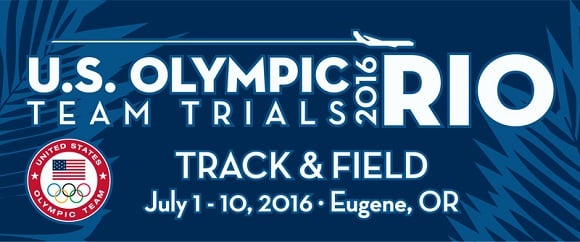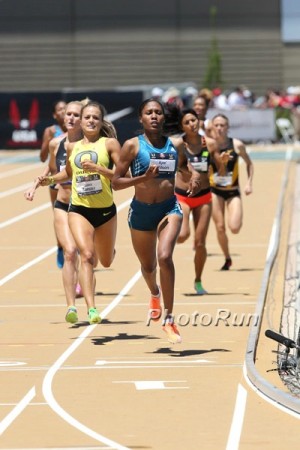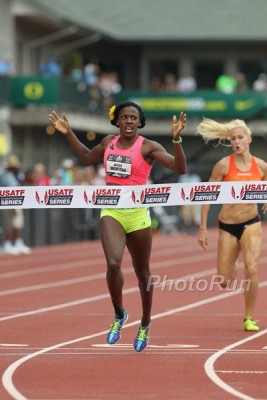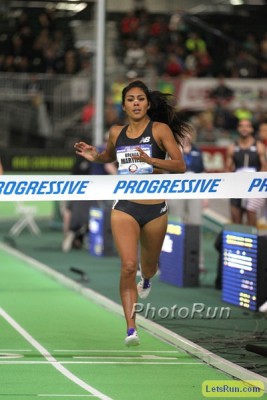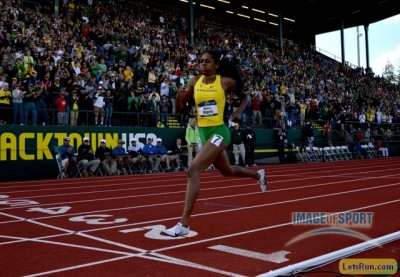US Olympic Trials Women’s 800: Prepare For Chaos In The Most Wide-Open Distance Event Of The Trials
By LetsRun.com
June 29, 2016
One of the greatest events in track and field — the United States Olympic Team Trials — are upon us. No domestic event holds more significance or produces more drama than this meet, which will be held at Hayward Field from July 1-10. LetsRun.com will have all hands on deck, providing wall-to-wall coverage from Eugene over the next two weeks. Below is our look at the women’s 800.
Before you read the preview, please make sure you enter our prediction contest: LRC $200,016 LRC Running Warehouse Trials Prediction Contest is Here!
Schedule/entries * TV/streaming information * LRC Trials coverage hub
LRC event previews: M 10k * W 10k
Women’s 800 (prelims Friday, July 1, 7:45 p.m. ET; semis Saturday, July 2, 2:43 p.m. ET; final Monday, July 4, 8:42 p.m. ET) *Rio Standard is 2:01.50
| Name | Affiliation | Qualifying time | SB | Comment |
| Ajee’ Wilson | adidas | 1:57.87 | 1:59.72 | Rojo says you’re an idiot if you don’t at least pick her top 3 even though she barely made team last year and this event is tough |
| Molly Ludlow | Saucony | 1:58.68 | 1:59.93 | 4th in 2012 and 4th on 2016 US list at 1:59.93 just .21 behind Wilson at Boston meet |
| Brenda Martinez | New Balance | 1:59.06 | 1:59.89 | Got bronze at Worlds in 2013. Tied for #2 on 2016 US list at 1:59.89 |
| Chanelle Price | Nike | 1:59.10 | 2:00.80 | Seasonal best of 2:00.80 for 2014 World Indoor champ |
| Alysia Montaño | ASICS / New York Athletic Club (NYAC) | 1:59.15 | 2:00.78 | Undefeated on year, beat Grace, Williams, Price, Ludlow and Roesler at Pre but hasn’t raced since then in late May. Won last year |
| Raevyn Rogers | Oregon | 1:59.71 | 2:00.75 | NCAA champ has run 2:00.75 this year and 1:59 last year. First USA senior meet |
| Kate Grace | Oiselle | 2:00.05 | 2:00.05 | Yale’s finest is running great this year, won 1500 at Hoka in PR and 2nd to Montaño at Pre. Went sub 2:00 in 2013 |
| Maggie Vessey | 2:00.05 | 2:00.82 | 2:00.82 is her seasonal best | |
| Laura Roesler | Nike / Texas Elite Track Club | 2:00.15 | 2:00.15 | 4th at World indoors but only 9th at Birmingham DL |
| Lauren Wallace | Oiselle | 2:00.48 | 2:02.67 | Hasn’t cracked 2:02 this year |
| Chrishuna Williams | 1:59.89 | 1:59.89 | Former Arkansas runner is tied for #2 on 2016 US list | |
| Charlene Lipsey | adidas | 2:00.60 | 2:00.65 | Still only 24 year old. |
| Phoebe Wright | Nike | 2:00.61 | 2:01.03 | Admits to visiting LRC and has gone sub-2:00 in the past. Both good things. |
| Dana Mecke | Texas Elite | 2:00.76 | 2:02.20 | Hasn’t cracked 2:02 this year |
| Mckayla Fricker | Brooks | 2:00.81 | 2:01.55 | Former DIII star |
| LaTavia Thomas | 2:00.95 | 2:02.49 | Hasn’t cracked 2:02 this year | |
| Olivia Baker | Stanford | 2:01.02 | 2:01.02 | 2nd at NCAAs |
| Hanna Green | Virginia Tech | 2:01.17 | 2:02.45 | 2nd NCAA indoors, bombed outdoors. |
| Shannon Leinert | Brooks / Speed Factory Athletics | 2:01.62 | 2:03.19 | 29-year old hasn’t broken 2:03 this year |
| Geena Gall | Brooks | 2:01.87 | 2:03.34 | Made team in 2012 |
| Kaela Edwards | 2:01.97 | 2:01.97 | NCAA indoor mile champ | |
| Margaret Farley | Bull City Track Club | 2:02.00 | 2:02.00 | PRd on June 11th |
| Erin Donohue | 2:02.17 | NM | 2008 US Olympian at 1500 | |
| Kendra Chambers | Texas Elite Track Club | 2:02.20 | 2:02.15 | |
| Olicia Williams | Baylor | 2:02.26 | 2:04.12 | |
| Annette Melcher | U.S. Air Force | 2:02.32 | 2:03.98i | |
| Dominique Jackson | Oiselle / SRA Elite | 2:02.39 | 2:02.39 | |
| Carsyn Koch | Cedarville | 2:02.39 | 2:02.39 | |
| Kenyetta Iyevbele | 2:02.43 | 2:03.37 | ||
| Bethany Praska | 2:02.44 | 2:02.44 | ||
| Anima Banks | Duke | 2:02.49 | 2:02.49 | |
| Megan Krumpoch | New Balance | 2:02.58 | 2:02.58 | |
| Cecilia Barowski | 2:02.62 | 2:02.62 | ||
| Ceaira Brown | 2:02.82 | 2:02.82 | ||
| Shea Collinsworth | BYU | 2:02.83 | 2:02.83 | |
| Raquel Lambdin | 2:02.85 | 2:03.27 | ||
| Baylee Mires | Washington | 2:02.97 | 2:03.91 | |
| Sammy Watson | 2:02.91 | 2:02.91 | 16-year-old World Youth champ won US Jrs last week |
The women’s 800 is easily the most wide-open mid-d/distance event of these Olympic Trials. No woman has separated herself through the first six months of 2016: Ajee Wilson is the U.S. leader at 1:59.72, and she’s one of 12 Americans who have run between 1:59.72 and 2:00.82 this year. As you know, only eight women can make the final (even making the semis will be tough: there are 16 spots for 39 entrants) and only three will don the red, white and blue in Rio. Anyone who tells you they have this event figured out is lying.
With that disclaimer, we’ll do our best to analyze the race. Wilson is obviously among the favorites. She finished sixth at Worlds in 2013, won USAs at age 20 in 2014 and still made the team last year even though she was hurt going into USAs and lost her shoe in the final. Plus she’s the U.S. leader, just as she was in 2014 and 2015. Wilson endured a couple of hiccups at the start of her outdoor season, finishing last in the Rome Diamond League on June 2 in 2:03.33 and 7th three days later in Birmingham in 2:00.81. But when we caught up with Wilson before the adidas Boost Boston Games on June 17, she said she there was nothing to worry about and training was going well. She backed that up with a U.S. leader at that meet. When you factor in her history of success, plus her dominant indoor season (2:00.09 sb, U.S. title, World Indoor silver), Wilson has a great shot not just to make the team, but to win.
Her biggest obstacle is Alysia Montaño. Montaño has raced just twice this year, but both were victories (2:01.27 in Berkeley on April 23; 2:00.78 at Pre on May 27); in the latter, against many of the top Americans at Pre (Kate Grace, Chrishuna Williams, Chanelle Price, Molly Ludlow, Laura Roesler), she beat them all. And in case you forgot, Montaño is a stud, with a 5th at the 2012 Olympics and two 4th’s at Worlds (2011 & 2013). In reality, those were all medal-winning performances; she’s just unfortunate in that her prime coincided with several Russian dopers and Caster Semenya. With six U.S. titles, we’re not worried that she hasn’t raced since Pre (she took a similar break last season before winning USAs). Assuming Montaño’s absence from the scene was due to personal choice, not injury, she either has to be viewed as the favorite or co-favorite with Wilson.
The battle for third
Wilson and Montaño are far from locks for the top two spots. The fact of the matter is, no woman has separated herself from the field in this event, which by its nature is already one of the most unpredictable in track and field. But the two aforementioned women have shown enough, in 2016 and the past, to be considered decent bets to make the team. Who has the next-best odds? It’s hard to say exactly, but here are the candidates:
Brenda Martinez, 28 (1:57.91 pb, 1:59.89 sb)
Martinez has made the last two U.S. outdoor teams and made the U.S. indoor team at 1500 this year as well, placing fifth in the final. She battled a hip injury last year and has yet to reclaim the form of 2013 that saw her earn bronze at Worlds. But after a rough 1500 opener at Drake this spring, she’s gotten better every time out, clocking 4:03 at Pre, winning the Portland Track Festival in 2:00.21 and dipping under 2:00 on June 17 in Vancouver (1:59.89). On their own, none of those results scream “I’m going to make the team!” but taken together, they’re a good sign that Martinez is fit.
Molly Ludlow, 28 (1:58.68 pb, 1:59.93 sb)
Ludlow enjoyed her best season as a pro in 2015, breaking 1:59 for the first time, and like Martinez, has shown improvement in recent weeks, culminating with her 1:59.93 sb on June 17, a time that ranks her #4 in the U.S. this year. But can she overcome her past heartbreak in Eugene? (4th at 2012 Trials, 4th at 2015 USAs)
We’re fearful she very well could end up finishing 4th again.
Kate Grace, 27 (1:59.47 pb, 2:00.05 sb)
The Yale grad, who was 4th at USAs three years ago, has been rejuvenated under new coach Drew Wartenburg in 2016. She ran 2:00.05, her #2 time ever at the Portland Twilight meet on May 15 and since then won the 1500 at Oxy, finished second to Montaño at Pre and most recently won the 1500 at the Portland Track Festival on June 12. Grace is clearly in terrific shape and riding a wave of confidence, but can she continue to produce top results against the very best the country has to offer?
Laura Roesler, 24 (1:59.04 pb, 2:00.15 sb)
Six weeks ago, Roesler looked like a great bet to make Team USA. Finally healthy after a rough first year as a pro in 2015, the Oregon grad put together a stellar indoor season that saw her run an sb of 2:00.49 and take fourth at World Indoors. She kept that rolling outdoors, running 2:01, 2:00 and 2:00 in her first three meets, beating Martinez in the last one at Oxy. Her last three races have not gone according to plan, however. At Pre, she was only 7th in 2:02.27 against a field of Americans. Then she fell in Rome, DNFing, and was only 9th in Birmingham in 2:01.54. We’re not counting Roesler out but women’s 800 runners have almost no margin for error this season and Roesler’s recent results are not promising.
Raevyn Rogers, 19 (1:59.71 pb, 2:00.75 sb)
Rogers is most definitely the wild card in this field. She has won the last two NCAA outdoor titles (plus an indoor title) in dominant fashion and owns a personal best of 1:59.71, set as an 18-year-old true freshman in 2015. Here’s the complete list of women to have broken 2:00 in college (per Track & Field News): Suzy Favor Hamilton, Katie Waits, Montaño, Rogers. That’s it.
Rogers’ NCAA performance three weeks ago becomes even more impressive when you realize she ran 2:00.75 (winning by almost two seconds) despite not going to the lead until 200 to go (she closed in a speedy 29.64 for her last 200). That suggests she’s capable of much, much faster. Perhaps not a Brazier-level performance, but this is a woman who’s been a phenom for years: she ran 2:06 at age 12 and earned bronze at World Youths back in 2013. The biggest concern is the rounds: Rogers didn’t look great in her prelim at NCAAs, barely nabbing one of the auto qualifiers, and that was against women who were not in her league. How will she fare against a bunch of 1:59/2:00 types at the Trials?
One thing that will help her is the Oregon crowd. They go nuts when they see someone in the Oregon uniform contending for an Olympic spot. She’s got a great shot at being the 2016 version of Andrew Wheating (Related: “An Oral History Of The 2008 Men’s 800m Olympic Trials Final”).
Chrishuna Williams, 23 (1:59.89 pb/sb)
The most unlikely name on this list, Williams was only 4th at NCAAs last year for Arkansas and didn’t even make the final at USA Indoors, but she’s broken out outdoors. She broke 2:01 for the first time in winning Payton Jordan on May 1 and then broke 2:00 for the first time a month later in Atlanta, clocking a U.S. #2 of 1:59.89. Recently, she’s taken a step back however. She only ran 2:03.80 at Harry Jerome on June 17 as Martinez beat her by four seconds. Two days later in Victoria, Williams improved to second behind Melissa Bishop, but still only ran 2:01.63. She’s a nice story but is not entering the Trials on the strongest of notes.
Other women to watch: Charlene Lipsey (2:00.65 sb), Chanelle Price (2:00.80 sb, 2014 World Indoor champ), Maggie Vessey (2:00.82 sb, has made 7 of last 8 U.S. finals), Olivia Baker (2:01.02 sb, NCAA champ, World Junior bronze medallist at 400 in ’14), Phoebe Wright (2:01.03 sb, 6th last year, 3rd at USA Indoors)
LRC prediction: We feel fairly good about Wilson and Montaño going 1-2 in some order but picking the third spot is a doozy. Martinez has the best pedigree, and at her best, she’s clearly one of the top three 800 women in America. Plus she’s been running really well of late so we’d be foolish to pick against her. But Grace has been on fire, Ludlow’s rounding into form and Rogers’ potential is massive.
Our picks are 1) Montano 2) Wilson and 3) Martinez but we have a sneaky suspicion that we will be wrong with one of those picks and Rogers will be on the team as the hometown fans deserve another feel-good moment.
Regardless of who makes the Olympics, the women in this race need to do one thing right after it’s over – start standing up for themselves with regards to hyperandrogenism. We know it’s a dicey issue for feminists to talk about, but athletes with internal testes shouldn’t be allowed to compete in women’s athletics without treatment.
| [gravityform action=”polls” id=”407″ mode=”poll” cookie=”1 month” show_results_link=”false” display_results=”true” percentages=”true” counts=”false” ajax=”true”] |
